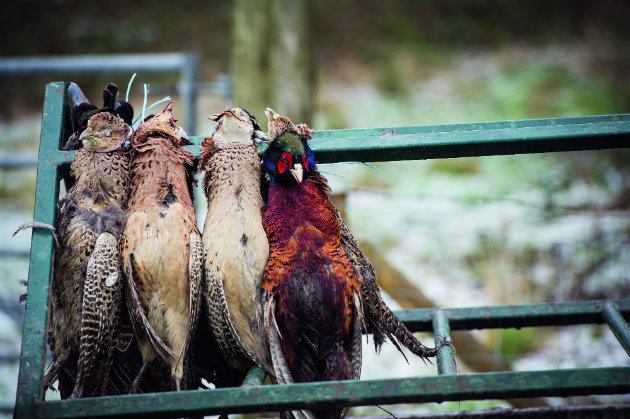Why a bit of moderation in shooting right now might not be a bad thing
A perfect storm of problems could force shoots to curb recent excesses — and a bit of moderation might not be a bad thing in the long-term, says Alasdair Mitchell

Hanging shot birds on a gate or rail for collection is better than putting them in the back of a truck
Could a shortage of imported gamebirds for this coming season signal structural change in driven game shooting? In years to come, will we look back and recognise this season as the turning point — the first time in decades that the inexorable trend of releasing more and more pheasants was reversed?
The immediate worry is that some gamekeepers may lose their jobs, because the shoots that employ them won’t be able to sell enough shooting due to a shortage of imported gamebird eggs and chicks. Any commercial entity relies on making a return on its investment — and the fixed costs of a major shoot can be very high. A shoot needs to sell shooting simply to wash its face. The pressure to generate income may be considerable.
Buying-in poults
Some far-sighted shoots are planning to bring their rearing back in hand as soon as they can. Yet I have already heard of a shoot owner having no luck in finding gamekeepers who have solid game-rearing experience. It is hardly surprising that many of today’s keepers, who often work single-handed, have become accustomed to buying in poults. It is going to take time and commitment from landowners to adapt to the new situation.
My understanding is that the supply of eggs and chicks from France was originally based mainly on partridges, with the French climate helping to provide an early-season boost for driven shooting on this side of the Channel. Over the years, those same suppliers extended to include cost-effective pheasant eggs and chicks. Many UK game farms and shoots became dependent on them. Now, because of disease, the whole house of cards may be about to fall over. There isn’t enough home-grown supply to pick up the slack in the short-term.
The cost of poults is rocketing. Prices for driven shooting were at record levels, even before any widespread cancellations. So will there be a knock-on effect on the prices for shot game? If so, this might be a good thing in the long-term. Certainly, the dire situation of recent seasons cannot go on. Paying dealers to take away shot game is not sustainable in any sense of the word.
Despite media hype over the cost- of-living crisis, the uncomfortable fact is that fewer people are eating meat of any sort. Small shoots can dispose of all they produce internally, while the biggest are best placed to negotiate contracts with game dealers. That may leave the middle-sized driven shoots with a headache in trying to dispose of game. The underlying problem is one of oversupply, given that the small number of Guns who shoot very large bags are, arguably, flooding the game meat market to the detriment of the mainstream shooting community.
More relaxed game shooting
Some say it is high time that we reeled in the excesses and got back to the sort of less intensive, more relaxed game shooting that was once common. It is less stressful for the keeper, as well as less likely to arouse the hostility of conservation bodies and our enemies. It won’t make them love us, of course, but our moderation may give their lobbying less traction. Above all, it might be the right thing to do, anyway.








